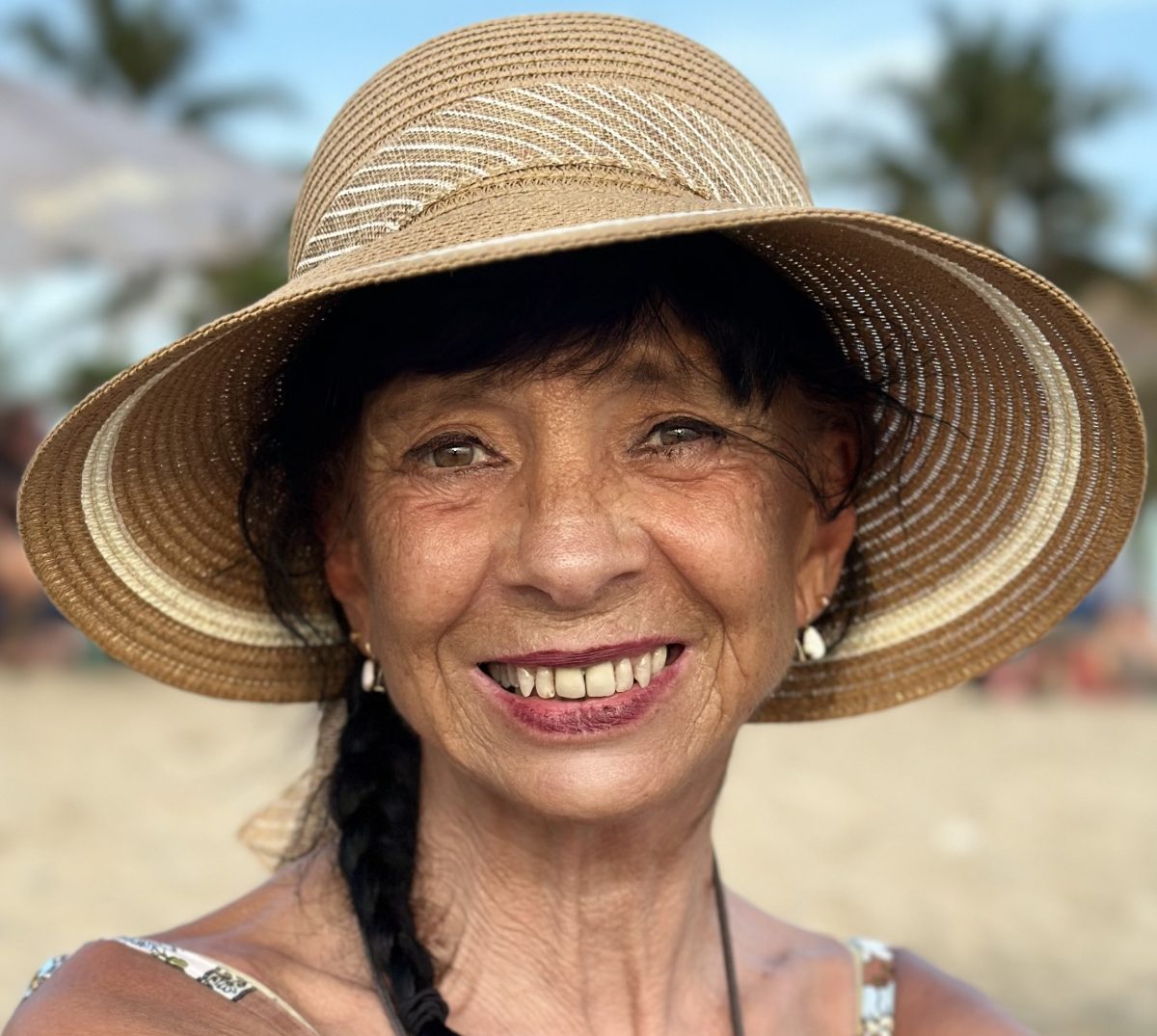
Wiradjuri woman Jeanine Leane has won Australia’s richest poetry prize. Photo: Peter Comisari.
As a child, Jeanine Leane’s Aunties encouraged her to write books on the large sheets of brown paper used to wrap bread.
“When I wasn’t writing my own stories, I was being read to and, most importantly, told stories about family and Country,” she said.
Gundagai-born and raised, Jeanine’s life revolved around a small family farm on a huge plain dotted with old-growth trees east of the town, the coursing Murrumbidgee River at its heart.
That was back in the early 1960s and ’70s and, with her mother’s siblings totalling 12, she said the house was always full of Aunties and animals and rich tales that traced well beyond the white settlement of an area that remains deeply significant to the Wiradjuri people.
“Before it was settled, it was a particularly special place where the river swings downstream,” Jeanine said. ”It was a bountiful place where there were a lot of spiritual gatherings.
”There was some sort of magnet there not just for us but the colonial people – not just the water, the rich river flats but the topography, the hills, held people and, of course, has inspired a multitude of poems, stories and ballads.”
When Jeanine left home to study, the stories her Aunties insisted be committed to memory went with her.
“I kept a journal where I scribbled down stories, usually based on people who’d influenced me and events I’d witnessed or experienced,” she explained.
“I wrote poetry too, sometimes as a different way to tell a story. But I wasn’t confident to share my work in public. I didn’t think I was a particularly good creative writer. I wrote mainly as a way of remembering.”
Today, Associate Professor Jeanine Leane is one of Australia’s most prolific and credentialled authors, teachers and academics.
Her accomplishments are many and lauded in the literary world, augmented when last October she won the richest poetry prize in Australia – Sydney University’s David Harold Tribe Poetry Award – which offers $20,000 for an original unpublished poem on any theme, up to 100 lines in length.
Jeanine’s poem Water under the bridge was selected from a shortlist of seven poems, out of a record 522 total submissions.
Inspired by her childhood memories of life in what she describes as the freshwater cradle of Australia, Water under the bridge was praised by the judges as a taut, layered and lyrical poem about legacy and inheritance.
“Its tracing of the intergenerational narratives and traumas of Indigenous women and a particular kind of racial discrimination – not appearing Black enough – is rendered poignant and aching by the total control over line and word,” they said.
Jeanine said winning the David Harold Tribe Poetry Award gave her a great sense of pride out of a path and process that was harrowing and cathartic.
“My grandfather was an English settler, my father an Irish Catholic, but my mother’s side of the family were Wiradjuri and I grew up in a house among three generations of women,” she said. “It was a very strong feminine influence.”
With lives underpinned by profound racial intolerances, Jeanine was both moored and obfuscated by her Indigenous blood.
“It was a nice place to be because it was our Country, but at the same time my grandfather ran the place like a tyrant and he was very into the idea of breeding out the Aboriginality so it was strangely duplicitous.”
Eventually, this place of her people was what she longed to escape and, encouraged by a mother and Aunties who could see education and writing as empowering, it was the halls of convent schools and universities in Goulburn, Armidale, Sydney and Canberra that would summon her voice.
She once said her secondary education exposed her to “a catalogue of misrepresentations of me and my people”.
”We studied the ‘literature of erasure’, in which all things Aboriginal were written out of the picture.”
Words became her weapon for activism.
As she puts it, “black writing has interrupted the unquestioned privilege of whites to represent non-whites in Australia”.
After a long teaching career, Jeanine completed a doctorate in Australian literature and Aboriginal representation and currently lectures at the University of Melbourne.
Her poetry and short stories in the area of Aboriginal literature, writing otherness and creative nonfiction have been widely published and awarded.
Her first volume of poetry, Dark Secrets After Dreaming: A.D. 1887–1961, won the Scanlon Prize for Indigenous Poetry, and her first novel, Purple Threads, won the David Unaipon Award.
A recipient of the University of Canberra (UC) Aboriginal and Torres Strait Islander Poetry Prize, a Red Room Poetry Fellowship and two Australian Research Council (ARC) Fellowships, Jeanine has twice won the Oodgeroo Noonuccal Prize for Poetry.
Her published works have appeared in Hecate: An Interdisciplinary Journal of Women’s Liberation, The Journal for the Association European Studies of Australia, Australian Poetry Journal, Antipodes, Overland and the Australian Book Review.
Last September, Jeanine was also named poetry editor of literary publication Meanjin, which is her segue from teaching into a retirement that next month will see her launch her new collection of personal and political poetry, titled Gawimarra: Gathering.
She said winning the David Harold Tribe Award was a tremendous honour.
“It inspired me to experiment with a longer lyric narrative piece to tell a story through a poem which was generous in the space it offered poets to tell their stories and the prize money offered in recognition of the power of poetry to tell a story. Thank you for recognising this important and under-told story of First Nations experience and ever-present history.”
Original Article published by Edwina Mason on About Regional.







